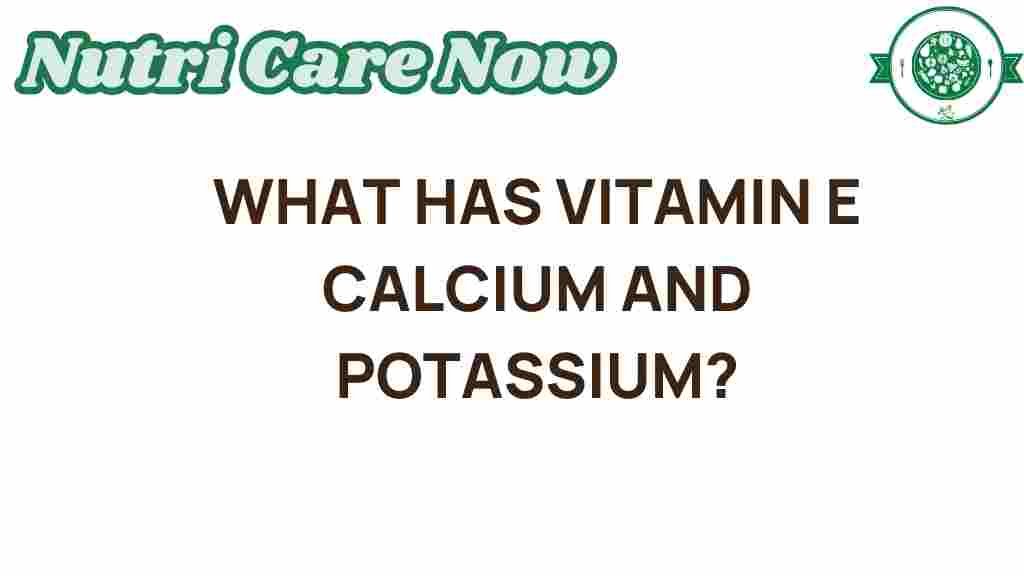Unveiling the Secrets of Vitamin E, Calcium, and Potassium
In our quest for optimal health and wellness, understanding the role of essential nutrients is crucial. Among these, Vitamin E, Calcium, and Potassium stand out due to their significant health benefits and dietary sources. In this article, we will explore these vital nutrients, their impact on our health, and how we can incorporate them into our diets for better nutrition.
Understanding Vitamin E, Calcium, and Potassium
Before diving into the specifics, let’s define what these nutrients are and their importance in our daily lives:
- Vitamin E: A fat-soluble antioxidant that helps protect the body from oxidative stress and supports immune function.
- Calcium: An essential mineral necessary for strong bones and teeth, muscle function, and nerve transmission.
- Potassium: A mineral that aids in maintaining fluid balance, muscle contractions, and proper nerve function.
The Health Benefits of Vitamin E, Calcium, and Potassium
Each of these nutrients plays a unique role in promoting health and preventing various diseases. Here’s a closer look at their health benefits:
Vitamin E
- Acts as a powerful antioxidant, neutralizing free radicals that can damage cells.
- Supports immune function, helping the body fight off infections.
- May reduce the risk of chronic diseases such as heart disease and cancer.
- Plays a role in skin health, promoting healing and reducing signs of aging.
Calcium
- Essential for bone health, helping to prevent osteoporosis.
- Supports muscle function and contraction, crucial for physical activity.
- Helps in blood clotting, ensuring proper healing after injuries.
- May reduce the risk of hypertension by helping regulate blood pressure.
Potassium
- Helps maintain proper fluid balance in the body, preventing dehydration.
- Supports heart health by regulating blood pressure and reducing stroke risk.
- Facilitates muscle contractions and nerve transmission.
- May help prevent kidney stones and reduce the risk of osteoporosis.
Dietary Sources of Vitamin E, Calcium, and Potassium
Knowing where to find these nutrients is essential for incorporating them into your diet effectively.
Vitamin E Sources
- Nuts and seeds (e.g., almonds, sunflower seeds)
- Vegetable oils (e.g., wheat germ oil, sunflower oil)
- Green leafy vegetables (e.g., spinach, broccoli)
- Fortified cereals and supplements
Calcium Sources
- Dairy products (e.g., milk, yogurt, cheese)
- Leafy green vegetables (e.g., kale, bok choy)
- Fortified plant-based milk (e.g., almond milk, soy milk)
- Fish with edible bones (e.g., sardines, salmon)
Potassium Sources
- Fruits (e.g., bananas, oranges, avocados)
- Vegetables (e.g., potatoes, spinach, tomatoes)
- Legumes (e.g., lentils, beans)
- Fish (e.g., salmon, tuna)
Incorporating Vitamin E, Calcium, and Potassium into Your Diet
Now that we know the importance and sources of these nutrients, let’s discuss how to incorporate them effectively into our diets:
Step 1: Plan Balanced Meals
To ensure you get adequate amounts of Vitamin E, Calcium, and Potassium, consider the following meal planning tips:
- Include a variety of fruits and vegetables in every meal.
- Opt for whole foods over processed foods to maximize nutrient intake.
- Incorporate nuts and seeds as snacks or toppings for meals.
Step 2: Choose Nutrient-Dense Foods
Select foods that are rich in these nutrients:
- Snack on almonds or sunflower seeds for Vitamin E.
- Enjoy yogurt or leafy greens to boost your Calcium intake.
- Include bananas or sweet potatoes to enhance your Potassium levels.
Step 3: Monitor Your Intake
Keep track of your daily nutrient intake to ensure you are meeting your needs. This can be done using:
- Food diaries or tracking apps
- Consulting with a healthcare professional or nutritionist
Troubleshooting Nutrient Deficiencies
Despite our best efforts, some individuals may still experience deficiencies in Vitamin E, Calcium, or Potassium. Here are some tips on how to address these issues:
Vitamin E Deficiency
- Consider incorporating more nuts, seeds, and leafy greens into your diet.
- Consult a healthcare provider about the possibility of supplements if dietary changes are insufficient.
Calcium Deficiency
- Incorporate fortified foods such as plant-based milk or cereals.
- Consider calcium supplements, especially for those with lactose intolerance or dairy allergies.
Potassium Deficiency
- Eat more fruits and vegetables, focusing on high-potassium options.
- Consult a doctor if you are on medications that may deplete potassium levels.
Conclusion
In conclusion, understanding the secrets of Vitamin E, Calcium, and Potassium is essential for maintaining good health and wellness. By incorporating these vital nutrients into your diet through various dietary sources, you can reap their numerous health benefits. Remember to plan balanced meals, choose nutrient-dense foods, and monitor your intake to ensure you meet your nutritional needs.
For more information on nutrition and health benefits, feel free to explore this resource. Your journey to better health starts with understanding the nutrients that fuel your body!
This article is in the category Health and created by NutriCareNow Team
